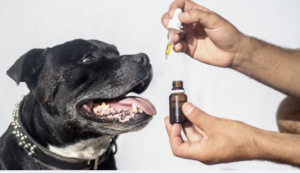Can CBD oil help dogs with cancer?
We understand how devastating it can be when you discover your dog has cancer. Just like with humans, cancer treatments for dogs can vary. Below we look into treatment options, and how natural therapies such as CBD can be used as a supplementary therapy.
Research is constantly discovering more about how we can better treat cancer in animals. Whilst there is currently no “cure” for cancer, there are effective therapies available.
How does cancer affect dogs?
Cancer is not just one disease, it actually refers to around 100 different diseases, as cancerous cells can form in any tissue of the body. Sometimes cells become abnormal and keep on growing. Abnormal cells then lump together and form a mass called a tumour.
In other cases, the abnormal cells circulate in the bloodstream – these are known as blood cancers.
Cancer is relatively common in dogs, and is most likely to occur in their senior years.
The American Veterinary Medical Association (AVMA) reports that one in four dogs will develop cancer at some time in their life and that 50% of pets over the age of 10 will develop cancer.
Some strains of cancers common in dogs include:
- Malignant lymphoma – a disease that occurs in the lymphatic system and interferes with a dog’s immune system.
- Mast cell tumours – an accumulation or nodule of abnormal mast cells (a type of immune cell) that resembles a tumour.
- Mammary gland tumours – prevalent in female dogs, especially if they haven’t been spayed.
- Soft tissue sarcomas – a type of cancer that generally forms as a painless lump in any of the body’s soft tissues, but most commonly in the thigh, shoulder, arm, pelvis and abdomen.
- Bone cancer – common in larger breeds.
Traditional cancer treatments for dogs
There are typically three approaches to treating cancer in dogs: surgery, chemotherapy, and radiotherapy. This will depend on the type of cancer, its location, and how advanced the disease is.
Surgery is an approach that’s used when tumours or cancerous cells can be removed from the body. This type of treatment is often used in conjunction with chemo and radiotherapy.
Chemotherapy refers to a broad range of anti-cancer drugs that can be used to fight the disease.
According to Dr. Joanne Intile, ‘chemotherapy can be administered orally, intravenously (into a vein), topically, subcutaneously (under the skin), intramuscularly (into a muscle), intratumorally (directly into a tumor) or intracavitary (into a body cavity).’
Dogs, fortunately, do not suffer as many negative side effects as humans because the dose is a lot lower in a veterinary setting.
And according to Dr. Rick Chetney Jr., ‘radiation therapy is a localised therapy, like surgery. It’s often used for tumours that we can’t surgically remove because they’re up against necessary structures such as the heart or brain.’

Can CBD help dogs with cancer?
If your dog has been diagnosed with cancer, it is important to discuss a personalised therapy plan with your vet to safeguard your pet’s quality of life during the treatment process.
CBD can be used as a supplementary therapy to support your dog’s treatment.
CBD can be prescribed to help treat the symptoms of cancer, as an adjunct to conventional forms of medication or treatment, or where those conventional methods have failed.
Managing cancer treatments with CBD
Research has shown that CBD can help treat inflammation and pain – two common symptoms in cancer patients.
The same study examined CBD use for general chronic pain. The researchers concluded that there is substantial evidence for cannabis as an effective treatment for chronic pain in animals, and that CBD may also reduce inflammation.
A review of the role of cannabinoids in pain modulation in animals looked at scientific findings regarding the signalling pathways of the endocannabinoid system, concluding that the evidence suggests cannabinoids (such as CBD) can be used in veterinary medicine to treat acute, chronic and neuropathic pain.
A meta-analysis of three studies found that CBD may reduce pain scores for dogs with osteoarthritis, and it also highlights the potential of CBD as part of multimodal therapy for animals experiencing pain. An article in Science Direct also recognises the evidence that chronic osteoarthritic pain in dogs can be reduced by supplementation with CBD.
When it comes to alleviating nausea and vomiting, which are common side effects of chemotherapy (powerful drug treatments that kill fast-growing cells in the body), CBD may have a role to play too according to this article.
It has also been found to act as an appetite stimulant.
Can CBD help slow the spread of cancer cells?
Although there is currently no cure for cancer, CBD is being studied on how it may aid in slowing the growth of cancer cells and make existing cells more susceptible to chemotherapy drugs.
A 2012 study as well as a 2013 study found that CBD therapy ‘increases endocannabinoid levels, exerts chemopreventive effect in vivo, and reduces cell proliferation through multiple mechanisms.’
Another 2012 study demonstrated that administration of CBD with cytotoxic agents (chemotherapy) increases drug uptake and potentiates cytotoxic activity in human glioma cells, which are supportive cells that surround nerve cells and help them function.
A more recent study (2024) was undertaken to demonstrate the anti-cancer effects of the phytocannabinoids, cannabidiol (CBD) and ∆9-tetrahydrocannabinol (THC) in canine and human lymphoma cell lines and to compare their inhibitory effect to that of endocannabinoids.
This study showed that CBD was the most potent phytocannabinoid in reducing lymphoma cell viability in some cells. It suggests that future studies should use CBD for further cannabinoid testing as it might reduce tumour burden in malignant non-Hodgkin lymphoma cells of canines.
While more research is needed to assess the role of CBD in slowing the growth of cancer cells, it is worth considering how CBD can be used as an adjunct therapy and non-toxic cancer management tool for dogs.
Cancer treatment plans to manage symptoms with CBD
Your vet will be able to develop a treatment plan and a dosing schedule for your dog.
Broadly, though, when it comes to the dosing of CBD for dogs the best approach is to “start low and go slow.”
CBD is reported to have a biphasic dosing curve, which means that there is a sweet spot where the dosage is just right. If you go beyond that point, then the benefits can be lost.
Careful monitoring is required and, for more sensitive patients, it is generally advised that the dose only be raised in small increments.
The dose may be accelerated in cases where your dog is experiencing a lot of pain or requiring palliative care, but this should always be on the recommendation and guidance of a vet with experience in prescribing CBD.
We recommend checking in weekly with your vet to monitor progression as it can take up to two weeks for CB receptors to up-regulate and for your dog to benefit.
If you would like to find a prescribing vet near you who can treat your dog with CBD, please contact us or ask your Vet if they prescribe CBD for the treatment of dogs with cancer. They can register to prescribe HERE.







